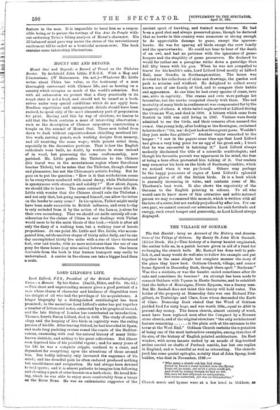MOUN 0111 AND BEYOND.
Mount Onii and Beyond: a Record of Travel on the Thibetan Border. By Archibald John Little. F.E.G.S. With a nap and Illustrations. (W Heinemann. 10s. net.)—Whatever Mr. Little writes about China has value, as the testimony of a man thoroughly conversant with Chinese life, and as bearing on a country which occupies so much of the world's attention. But with all submission we protest that a diary practically in its rough state is not a book, and should not be issued as a book, unless under very special conditions which do not apply here. Needless repetitions and unimportant details should have been excised, to speak only of the most elementary part of preparation for print. Having said this by way of stricture, we hasten to add that the book contains a mass of interesting observation : such as the description of Chinese carpenters constructing a temple on the summit of Mount Omi. These men toiled from dawn to dusk without superintendence chiselling mortised lat- tice work, carving panels, each working designs from memory, and all receiving the same wage ; while priests aided them, especially in the decorative portions. That is how the English cathedrals were built, no doubt, by workers in stone instead of in wood, but possessing the same craftsmanship, now perished. Mr. Little prefers the Thibetans to the Chinese (his travel was in the mountainous region where Sze-chuan touches Thibet), but he notes that the Thibetan, though cleaner and pleasanter, has not the Chinaman's artistic feeling. But he goes on to put the question : "Row is it that testheticism seems to be everywhere combated with moral decay, while Philistinism is synonymous with strength and solidity ? " How shoat Japan, we should like to know. The same contrast of the races fills Mr. Little with wonder that the Chinese should rule the Thibetan ; and not only that, but going unarmed himself, can allow the tribes on the border to carry arms ? In his opinion, Thibet might easily have been made accessible to British influence, and even to-day is only secluded from it by the action of the Lamas, jealous for their own ascendency. That we should set aside entirely all con- sideration for the claims of China in our dealings with Thibet would seem to be the main thesis of this book,—which is after all only the diary of a walking tour, but a walking tour of heroic proportions. At one point Mr. Little and Mrs. Little, who accom- panied him, set themselves stages of thirty miles daily, and in one day accomplished thirty five miles with a rise of three thousand feet, over bad tracks, with no more assistance than the use of one pony for three hours (say nine miles) between them. One lesson derivable from the book is that human transport may easily be undervalued. A carrier in Sze-chuan can takes bigger load than a mule.






















































 Previous page
Previous page